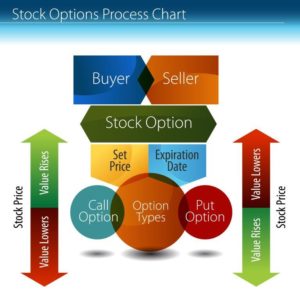 Options are contracts that give the owner the right (but they are not required) to buy or sell an underlying asset (like a stock, ETF, etc.) at a fixed price for a specific period of time. There are two standard types of option contracts: a call and a put. Option contracts are for a specific amount of time. The price of the option is dependent upon the underlying asset or security.
Options are contracts that give the owner the right (but they are not required) to buy or sell an underlying asset (like a stock, ETF, etc.) at a fixed price for a specific period of time. There are two standard types of option contracts: a call and a put. Option contracts are for a specific amount of time. The price of the option is dependent upon the underlying asset or security.
A call option is a contract that gives the investor the right to buy the stock the is related to the option at a later date for a certain price, while a put option allows the investor to sell that particular stock.
The underlying concept is that if you purchase a call option you think the stock will increase in value and you can buy the stock at the lower contract price at a later date and make a profit. The problem is if the stock does not increase then the investor runs the risk of losing the full amount of his/her investment.






